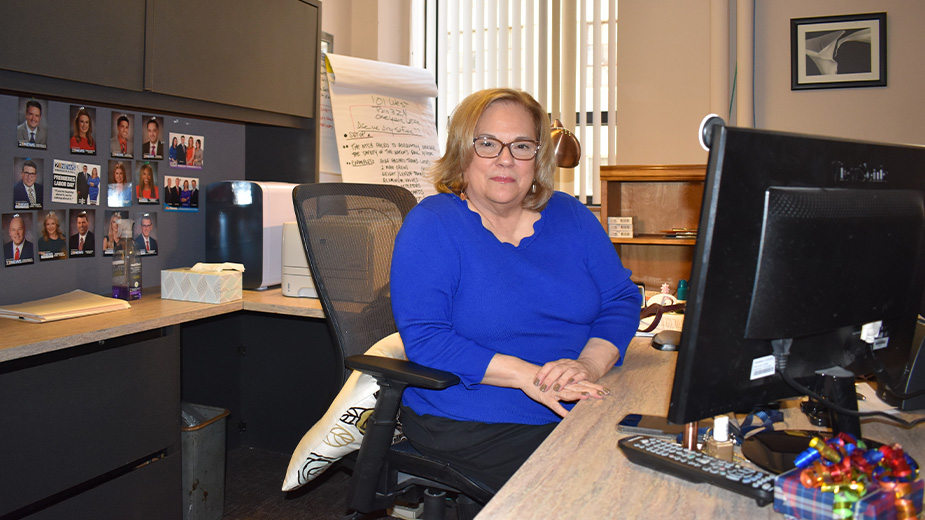Alexander Retires from WFMJ, Reflects on 44-Year Career in TV News
YOUNGSTOWN, Ohio – Seated at her desk in WFMJ-TV’s downtown Youngstown offices, news director Mona Alexander shared a cellphone video taken on her drive to work early that morning.
The screen showed the city lights against the backdrop of the predawn sky downtown as she crossed the Market Street bridge heading into downtown, a view she has experienced since she started in local news more than four decades ago and worked the City Hall beat.
“It’s just beautiful, and I love it,” she said. “I’m really going to miss this.”
Officially retiring at the end of the month, Alexander’s last day at the station was Friday. It concluded a career that included covering a natural disaster that seared the last day of May into local memory, mob murder trials and the rise and calamitous fall of one of the most infamous figures in Mahoning Valley political history.
“I’ve now been here 44 years and just made my home here,” the Chicago native said. “And I don’t regret it for one second.”
Alexander got her first job out of college at WKBN-TV. Raised in what she described as “a family of news consumers,” her father would bring home what he called his “10 pounds of paper” on Sundays, that day’s editions of the Chicago Tribune and Chicago Sun Times.
It wasn’t until she took a journalism class during her sophomore year in high school that she realized it was “an actual job that people got paid to do for a living. I thought it was the most remarkable thing in the world,” she said.
Alexander started at WKBN in 1979, a time when journalism remained a largely male-dominated profession and there were no female news managers or solo anchors. She probably was naïve about any potential or perceived disadvantage based on her gender, she acknowledged.
“I didn’t know any better. I just busted down the doors and said, ‘Let me in.’” she recalled. “I never really felt that if somebody was not going to talk to me, it was because I was a female. I thought that they didn’t want to talk to the press, and I was just going to be tenacious.”
Mike Gauntner joined WKBN a couple of years before Alexander was hired and now is online content manager at WFMJ.
“She was confident. She was smart, which is the most important thing that a quality reporter can have,” he said. “She could get a story, but she wasn’t mean or aggressive. She could get the information without getting angry.”
Significant Stories
The early years of Alexander’s career coincided with the aftermath of Black Monday and the steel mill shutdowns of the late 1970s and early 1980s, as well as political shifts including the elections of James A. Traficant Jr. as sheriff and Patrick J. Ungaro as Youngstown mayor.
Other significant stories she covered included the impact of the May 31, 1985, tornado in Niles, the murder of mobster Joey Naples and Traficant’s 1983 bribery trial, the year before his successful race for Congress, where he remained a member until his 2002 conviction on racketeering and bribery charges.
“That was a big story for me,” Alexander said of Traficant’s 1983 trial. She had to navigate how to cover the trial in the federal courtroom, where no cameras were allowed, and learned from others, including veteran Vindicator reporter Tim Yovich, the rules of federal court.
She recalled seeing FBI agents and Justice Department attorneys come in daily with “reams and reams of what they wanted the jury to think was evidence against the defendant.” By contrast, Traficant – who had fired his attorney and was representing himself – would enter with a gray store bag with cough drops in it and “some stuff under his arm,” and sit alone at the defense table.
She wondered about the optics – “We didn’t have that word back then,” she said – and how that was playing with the jury, and included that as color in her reporting. She later found that the jurors “did not really buy all of the great mounds of evidence that were against” Traficant and that his imagery “played much better” with them.
“This was a coming-of-age story for me, because after that I wasn’t the same reporter,” she reflected.
Opportunity at WFMJ
A decade after her hiring, she was promoted to assignment editor at WKBN, a position she held until 1997, when then-WFMJ general manager John Grdic contacted her about succeeding Art Jordan, who was retiring as news director. She felt she had gone as far as she could with WKBN and wanted a new challenge.
“This opportunity to come here, to have my own newsroom, be my own news director and make a go of it was really attractive to me,” she said.
Gauntner was let go from WKBN when new ownership took over the operations. Alexander hired him at WFMJ. He called her move to the station “just a logical step for her.”
Jack Grdic, WFMJ general manager and the son of the general manager who hired Alexander, recalled his father’s excitement as he shared the news that Alexander was joining the station.
“Our news at the time was not in a leadership position in the ratings,” he said. “She was instrumental and has been instrumental in changing all that.” As a reporter, she had dealt with “some of the toughest personalities the Valley could offer at the time,” and the tenets of journalism are important to her, Grdic said.
In taking on WFMJ’s news operation, Alexander started with the fundamentals of quality reporting: balanced reporting, fairness and hard work, Grdic said.
“It was a lot of fun because the ratings were not what they are now,” Alexander said. “Inheriting a news organization that’s on top, you want to make sure that you don’t make any mistakes; you kind of want to just keep things going and not do anything drastic.
“But when you’re coming from behind, oh, what the heck?” she continued. “You just start throwing stuff and see what sticks.” With the launch of a morning show, that meant going in a less traditional, more personality-based direction.
Similarly wanting to do something different with the new 5 p.m. show, which debuted in September 2022 with reporter Lindsay McCoy as anchor, she went with longer-format stories with “a highly talented news anchor who’s a really good interviewer,” she said.
“So it’s always trying something new and different, but finding the right components to put together to make it successful,” she continued. “That’s the trick. That’s really the hard part.”
Grdic credited Alexander for developing the station’s position in the market for political reporting. Debates the station has hosted include a 2006 match-up between gubernatorial candidates Ted Strickland and Ken Blackwell, and last year’s contest between J.D. Vance and Tim Ryan.
“It put us on the map to the point now where, frankly, candidates and campaigns call us, which is great,” he said.
Alexander pointed to the focus on longer-form investigative journalism at the station in recent years.
“I don’t want to hear that you can’t do that kind of reporting anymore. You can,” she asserted. “You just have to make it a priority, and it will come at the expense of other things. But I think people are really hungry for that kind of reporting, and I think there’s a patience for that kind of reporting.”
Gauntner praised his colleague for “knowing who to hire.” As opposed to people who just wanted to be on television, Alexander hired people who, like her, were intelligent, inquisitive and could get the job done. “She knew how to find people who actually wanted to do journalism,” he said.
Helping the Community
Alexander was instrumental in WFMJ’s annual Feed Our Valley campaign, which Grdic said has collected more than $1.5 million in donations and more than 1 million pounds of food.
The campaign was spurred by reporting on a local school closing, believed to have been the result of a flu bug. Her reporter found that the stomach pains that students were going to the school nurse for treatment were because they were hungry.
“I didn’t know [hunger] was a problem in the community. I feel so naïve,” Alexander said. “It was 17 years ago now, and 17 years ago I didn’t know that there were such things as the working poor.”
After reaching out to Second Harvest Food Bank and visiting its operations, she learned that educating people about hunger in the community was a key issue.
“So that part of the puzzle fell into place, because who better to help educate the public than people who have newscasts on every night,” Alexander said.
The station reached out to Sparkle Markets about putting food collection boxes in its stores and covered the various aspects of food insecurity in the area. She is gratified that the campaign has continued for 17 years and that so many people, businesses and organizations in the community have come forward to be a part of the effort.
“My personal philosophy is very simple. It’s always been leave things better than you found them,” she said. “Hopefully, I’ve done that here.”
Working with Young Journalists
Madison Tromler, WFMJ 6 p.m. co-anchor, said she considers Alexander to be a mentor. The station hired the Cleveland area native in May 2020 after she graduated from Kent State University.
“She’s helped me hone in on my skills and taught me the importance of real journalism, investigative journalism,” she said. Alexander has reinforced the importance of being tough and being a critical thinker, and she will “poke the hole” in a story and identify what she thinks is missing.
“Madison likes content. Madison likes journalism. Madison likes doing the digging, and she has the talent and the patience to do the research,” Alexander said. Part of a news manager’s job with younger journalists is discovering their specialties, even when they say they want to learn everything.

Alexander will fight for the kinds of stories that don’t typically make a television newscast if she feels they are important, and is good with developing and coaching young reporters, Tromler said.
“I feel like she’s actually started a fire in this newsroom that will never go out,” she said. “That’s the passion to do journalism that makes a difference and helps people make decisions about their lives.”
Alexander said she loves working with young journalists.
“As long as you are serious about the news part of it, I’ve got your back. If you just want to be on television, I’m not your news director,” she said. “If you want to serve the community, if you want to roll up your sleeves and do the job that old-time, old-school journalists do, then I’m your news director.”
Alexander said she emphasizes to new reporters not just to be accurate, but to be fair and correct.
“There’s a difference between accuracy and correctness, and I want them to be correct. I want their stories to have an impact in the best possible way and be as complete of a picture as you can give,” she said.
Grdic called Alexander a “dear friend” as well as a colleague. “The impact she has had here is immeasurable,” he said.
Alexander acknowledged she will miss her colleagues. Although she had considered taking on “some side hustles” after leaving WFMJ, Alexander said she reconsidered after she lost her mother in July.
“That is a time for reflection, you know, when you lose a parent. And I started thinking about me and my husband and how we’re in relatively good health, and I want to spend time with him,” she said.
“And all of a sudden, I gave myself permission to not have to be anybody or do anything after I retire. Now it’s an adventure,” she said. “So I don’t know, and I’m OK not knowing. I’m a little, teensy bit nervous about it, but I think I’m going to be fine.”
Pictured at top: Mona Alexander sits at her desk in WFMJ-TV’s downtown Youngstown offices.
Copyright 2024 The Business Journal, Youngstown, Ohio.



